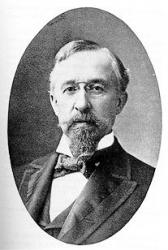Take time to be holy, speak oft with thy Lord;
Abide in Him always, and feed on His Word;
Make friends of God’s children, help those who are weak;
Forgetting in nothing His blessing to seek.
Take time to be holy – the world rushes on;
Spend much time in secret with Jesus alone;
By looking to Jesus, like Him thou shalt be;
Thy friends in thy conduct His likeness shall see.
Take time to be holy, let Him be thy guide,
And run not before Him whatever betide;
In joy or in sorrow still follow thy Lord,
And, looking to Jesus, still trust in His Word.
Take time to be holy, be calm in thy soul;
Each thought and each motive beneath His control;
Thus led by His Spirit to fountains of love,
Thou soon shalt be fitted for service above.
 William Longstaff was a wealthy Englishman whose church in Sunderland, on the northeast coast of England, hosted the first meetings of D.L. Moody and Ira Sankey in that area. Longstaff keenly supported both these evangelists.
William Longstaff was a wealthy Englishman whose church in Sunderland, on the northeast coast of England, hosted the first meetings of D.L. Moody and Ira Sankey in that area. Longstaff keenly supported both these evangelists.
There are two stories about the writing of this song. Ira Sankey wrote that Longstaff was prompted by a sermon he heard on the text, “Be holy, for I am holy.” (1Peter 1:16) George Stebbins, the composer of the tune, said that Longstaff had been inspired by the words of a missionary to China, who actually said, “Take time to be holy.” Perhaps both stories are true!
“Take time to be holy.” Share on XGeorge Stebbins wrote a great deal of Gospel music. He worked and travelled with D.L. Moody, Daniel Whittle, Philip Bliss, Ira Sankey, William Doane and Fanny Crosby. He kept over one hundred notebooks with clippings of poems and hymns he had gathered. (Imagine how he would have loved to carry an iPad!) While he was in India with another evangelist, George Pentecost, someone mentioned the need for a hymn on holiness. That’s when Stebbins took out William Longstaff’s poem and set it to music. He sent the song to Ira Sankey in New York, where it was published. The song has maintained its popularity, and certainly has an important challenge for us in the 21st century.
Holiiness... an important challenge for us in the 21st century. Share on XGeorge Stebbins lived to be nearly one hundred years old. Perhaps part of his secret was that he “took time to be holy”.
WORDS: WILLIAM LONGSTAFF MUSIC: GEORGE STEBBINS
S.A. SONG BOOK, 2015 EDITION, # 790 1987 EDITION, # 458
REFERENCE: MORGAN, ROBERT J., THEN SINGS MY SOUL
Instrumental:

Accapella:






